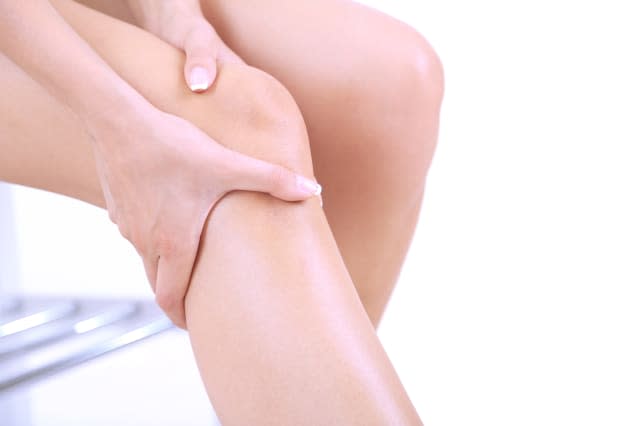What to do about leg cramp

Night-time leg cramps are very common, particularly as people get older. In fact, studies suggest that three-out-of-four people only have leg cramp at night (while one-out-of-five people have leg cramps during the day and night). It you're one of them, read on to find out what causes it, and what you can do to...
See also: What to eat to avoid muscle cramps
See also: How to soothe aching joints and muscles
What is leg cramp?
Cramp is caused by muscles involuntarily shortening. It can be very painful, and lasts anywhere from a few seconds to 10 minutes. Typically it occurs in the calf muscle, but the feet and thighs can also be affected. During an episode, the cramped muscle will become tight and painful and the feet and toes stiffen. Once the cramp has eased, you may experience soreness in your legs for hours afterwards.
Cramp isn't just painful for the sufferer. Regular bouts can keep you awake at night, and also disturb your partner's sleep.
Why does it get worse with age?
As we get older, the collagen fibres in our muscles get shorter and tighter – making them more prone to the effects of things like dehydration and exercise. For many people, there is no obvious cause or trigger, but others find that strenuous exercise (particularly if your body is not used to it) and being dehydrated makes them more prone to cramps.
Other possible causes include hormone fluctuations, peripheral arterial disease (PAD), diabetes, liver disease, a trapped nerve, muscle injury, and certain prescription drugs, such as diuretics and statins.
The role of magnesium
Magnesium plays an important role in the body, helping to maintain normal muscle function, acting as a muscle relaxant, and keeping blood vessels healthy.
Research suggests that 50 per cent of people with a western diet have low levels of the mineral in their bodies. The recommended intake for adults is 375 milligrams of magnesium a day, but most people in Europe only get around 200 and 300mg. This is considerably less than previous generations - which some experts put down to the increased use of fertilisers, the depletion of magnesium from soils, and the wide consumption of refined cereals.
Magnesium is found in a variety of foods, including dark leafy greens, fish, lentils, nuts, seeds and quinoa. You might also want to take a supplement. A study published in the Magnesium Research Journal asked people who get leg cramp to take a daily magnesium oxide supplement that also contained vitamins B6 and E. After two weeks, 82 per cent of people said their leg cramps had stopped, while a further six per cent said it had reduced the number of episodes they suffered.
How to cope with cramp
If you get leg cramp, try holding the big toe of the affected leg and flex it up towards you. Alternatively, get out of bed and straighten the leg, then try walking around on your heels. You may find it helps to massage the muscle with something like Deep Heat or Fisiocrem. Taking a pain killer, such as paracetamol or ibuprofen can also help ease the pain.
Taking a warm bath and massaging and stretching your legs before bed may help to prevent cramp occurring in the night. As cramp can result from poor circulation, it's a good idea to move frequently throughout the day, and wear bed socks at night.
When to see your GP
If you suffer from leg cramps two or three times a week or find that the pain and sleep disturbance is affecting your quality of life, see your doctor. Your GP can check for an underlying cause and decide whether to adjust any medication you are taking. You should also see your doctor if you notice that your leg muscles are shrinking or becoming weaker.
According to the NHS, you should seek immediate medical help if:
• The cramps last longer than 10 minutes and fail to improve, despite exercise.
• Cramps develop after you come into contact with substances that could be toxic (poisonous) or infectious, for example, if you have a cut that is contaminated with soil, which can sometimes cause a bacterial infection, such as tetanus, or after being exposed to elements such as mercury or lead.
In these circumstances, contact your GP for advice immediately. If this isn't possible, contact your local out-of-hours service or call NHS 111.



